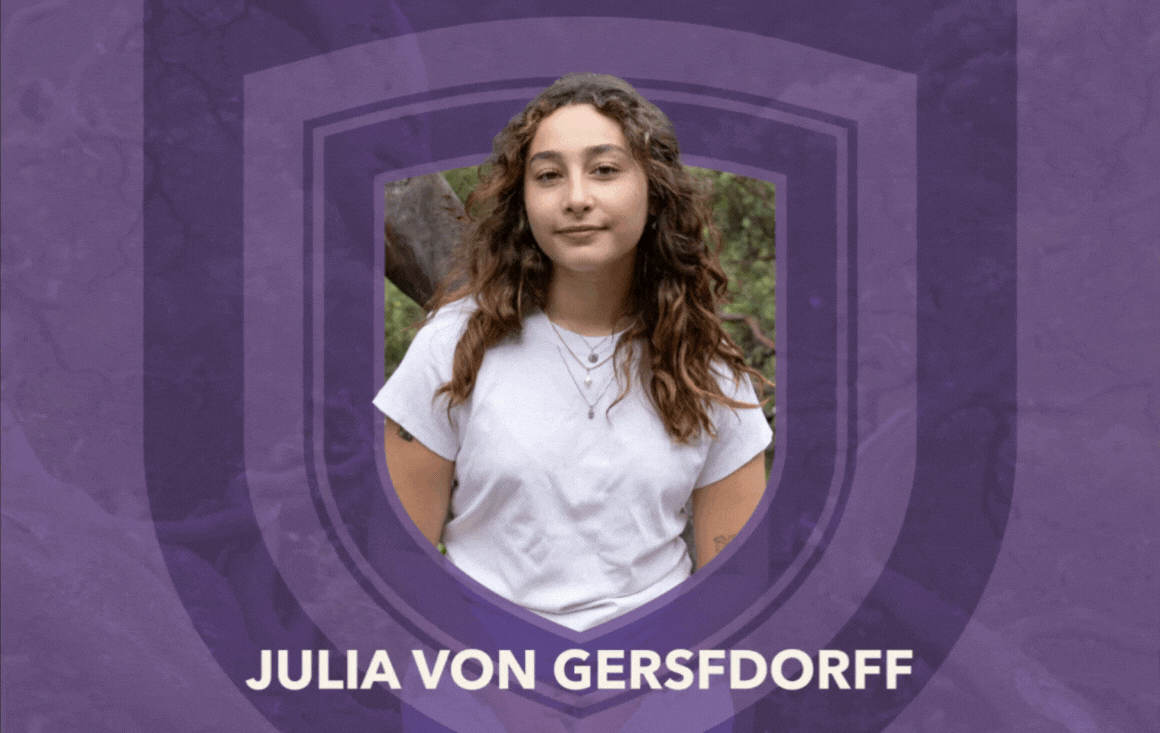Bolstering the B in LGBTQ+

When Neha Mann ’25 was in high school, she remembers being overly concerned with what others thought of her. From her values to choosing her college major, she felt an enormous pressure to follow others’ expectations instead of her own desires.
Flash forward. Now, as a junior at Santa Clara University, Mann has become outspoken within animal rights and climate action student groups like PAWS and tUrn—proudly standing up for the causes she believes in.
“I didn’t really know what I was doing when I came to college,” she says. “However, when I realized that I had a voice, it pushed me to become more directly involved with advocacy opportunities around campus.”
This interest in advocacy work extended into the classroom as well.
“After one of my earliest public health classes with Michele Parker, I knew right off the bat that this was the major for me,” Mann recalls. “Learning how structural inequalities led to health disparities was so interesting and in line with my values. I was like, ‘Whoa! They did not cover this in high school.’”
Since then, each public health class she took deepened her sense that she could use her knowledge of public health to help others. She just needed an opportunity to put that passion into practice.
After hearing about a local government internship program from a fellow member of Delta Epsilon Mu, SCU’s pre-health fraternity, Mann secured a summer fellowship at the County of Santa Clara Office of LGBTQ Affairs—which was the first county-level office of its kind created in the U.S.
While exploring options for her fellowship focus, Mann noticed that while the office had plenty of existing public health research on the “L,” “G,” and “T” parts of the “LGBT” acronym, the “B,” or bisexual community, was not equally represented—something that she hoped to rectify by bulking up the department’s research.

Mann (right of the banner) joins her colleagues at Silicon Valley Pride's parade.
Although 57% of the LGBTQ+ community identifies as bisexual, Mann’s interviews with local bisexual community members revealed experiences with exclusion in LGBTQ+ spaces, difficulty accessing healthcare, and marginalization in educational settings—examples of an experience called “bisexual erasure.”
This erasure can have a ripple effect on LGBTQ+ health and policy. For example, if bisexual people aren’t explicitly mentioned in publicly available HIV/AIDS literature, they might feel excluded, which means they’re less likely to get tested, less aware of preventative measures, and even could face discrimination or bias from medical professionals.
It’s a complex and overlooked issue, but not one without solutions.
“When you’re talking about these structural inequalities, there isn’t one big fix,” she explains. “Many of my interview participants pointed to the need for community-based solutions, like enacting policies that would ensure that a bisexual person would be present in every room where decisions are being made.”
After delivering a 17-page report of her findings and recommendations to the county office at the end of her internship, Mann returned to SCU eager to dig into more areas where government policy intersects with LGBTQ+ health.
She connected with public health professor Sonja Mackenzie, who has made a name for herself through her groundbreaking research in this field. Mackenzie had recently begun her new “Policy and Resistance Project,” which would collaborate with local healthcare and education advocates in challenging anti-LGBTQ+ proposals emerging within California. To support this urgent work, Mann was hired as Mackenzie’s Health Equity Scholar—the first time this SCU-funded role would be solely focused on LGBTQ+ research.
“It’s been disheartening to see the many anti-LGBTQ+ measures happening around the country,” Mann says. “But because this is something I care about, I’m glad I can use public health as a way to offer a more academic perspective on how to support people through this time."
In the short time since Mann joined this project, she’s already seen her work’s impact, as some of her research was recently used by community advocates to bolster gender inclusion within a Berkeley school district.
While it might be easy to get overwhelmed by the amount of work yet to be done, thanks to her personal growth at Santa Clara, Mann is confident in her path and is staying the course.
“Everything I’ve learned in my classes and research has reassured me that I’m going in the right direction to serve as a public health advocate.”
The Public Health program strives to positively impact the health of our campus community, and the health of communities beyond Santa Clara University.


